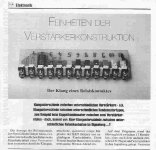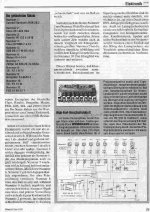Hello!
This would be very nice! Please try to find it.
If you can't post it in the forum, please send it to my mail adresse: daniel.berghold@aon.at.
I would be very glad.
Thanks
Daniel
This would be very nice! Please try to find it.
If you can't post it in the forum, please send it to my mail adresse: daniel.berghold@aon.at.
I would be very glad.
Thanks
Daniel
Glad I found this thread-
I have a brochure that I found somewhere, which advertises Crydom brand relays. Among other types, they have 2 which cought my attention: One is "Solid State Optically isolated Input/Output relays" which are siad to deliver electrically clean, photo-isolated, noise free output. The other are "optically coupled solid state relays" which are said to be ideal replacements for electromechanical relays. Any idea if these are super cool, or just not compatible with high end audio? I do not know the first thing about relays...
I have a brochure that I found somewhere, which advertises Crydom brand relays. Among other types, they have 2 which cought my attention: One is "Solid State Optically isolated Input/Output relays" which are siad to deliver electrically clean, photo-isolated, noise free output. The other are "optically coupled solid state relays" which are said to be ideal replacements for electromechanical relays. Any idea if these are super cool, or just not compatible with high end audio? I do not know the first thing about relays...
As I remember, AC output SSR's are fairly limited bandwith wise. Remember they probably never have to see anything outside 50-400 Htz in industrial apps.
imix500 said:As I remember, AC output SSR's are fairly limited bandwith wise. Remember they probably never have to see anything outside 50-400 Htz in industrial apps.
That makes sense.... But some of these are DC output, and very low voltage/current requirement on top of that. I will have to scan the thing and post it here....
This is very dependent of the switching element. There are relays which have mosfet's as switching element and they are pretty fast but I doubt that they are particulary well suited. I thinks it better to use an analog switch instead.imix500 said:As I remember, AC output SSR's are fairly limited bandwith wise. Remember they probably never have to see anything outside 50-400 Htz in industrial apps.
As a good relay I recoemmend alsmost any brand with the same form factor as DS2 NAIS (small 2-pole relay) , for example Schrack RS, Omron, ITT, Takamisawa etc. There are many good brands to choose from.
Any idea if these are super cool, or just not compatible with high end audio?
Hi end? Keep those out of any audio circuit.
When looking at the test, the numbers are the test sequence and NOT the outcome.
When translating, the numbers 2 and 10 are the obvious winners.
These are Clare 851 A24 H2A and SEL RY 12W.
Looking at the picture the "UP" arrow on the Clare(#2) is visible, as is common for Mercury wetted relays.
The Clare has a better and stable spacial presentation.
The SEL is more precise.
The others are clearly influencing the sound to much.
Rest to say that Mercury wetted relays are difficult to get, especially here in Europe due to environmental laws.
When translating, the numbers 2 and 10 are the obvious winners.
These are Clare 851 A24 H2A and SEL RY 12W.
Looking at the picture the "UP" arrow on the Clare(#2) is visible, as is common for Mercury wetted relays.
The Clare has a better and stable spacial presentation.
The SEL is more precise.
The others are clearly influencing the sound to much.
Rest to say that Mercury wetted relays are difficult to get, especially here in Europe due to environmental laws.
Blindtesting, connected between CD-player and preamp.
No measurements are done.
Besides measuring the contact resistance, I wouldn't know of what to measure.
The outcome is just that the mentioned Clare and SEL are the winners by far.
I don't want to start a discussion here about measurements against listening tests, BTW.
Dick.
No measurements are done.
Besides measuring the contact resistance, I wouldn't know of what to measure.
The outcome is just that the mentioned Clare and SEL are the winners by far.
I don't want to start a discussion here about measurements against listening tests, BTW.
Dick.
How about a spectrum sweep to see what the bandwidth of the relay was and the response curve.
If it is passing a signal(not JUST audio) those things are pretty important.
I'm just fanning the flames..
Thanks,
Troy
PS, anyone have any ideas on my last post concerning the use of diodes as LBHajdu mentioned?
If it is passing a signal(not JUST audio) those things are pretty important.
I'm just fanning the flames..

Thanks,
Troy
PS, anyone have any ideas on my last post concerning the use of diodes as LBHajdu mentioned?
The others are clearly influencing the sound to much.
I have only had experience with 'the others' - that's why i've never liked using relays.
Many thanlks for posting the article, the idea of mercury relays to match my mercury rectifiers appeals to me.
Thnaks for the test!
But here are only reed relays tested! What's with normal relays like the NAIS? Are reed relais in general better than normals?
Thanks
Daniel
But here are only reed relays tested! What's with normal relays like the NAIS? Are reed relais in general better than normals?
Thanks
Daniel
You're welcome.
"Normal" relays are designed for switching power, hence the larger contacts.
The reeds or small relays are more designed for low power or signal switching.
The contact material used determines the application.
I've no experience with the Nais relay.
Dick.
"Normal" relays are designed for switching power, hence the larger contacts.
The reeds or small relays are more designed for low power or signal switching.
The contact material used determines the application.
I've no experience with the Nais relay.
Dick.
Berki said:Thnaks for the test!
But here are only reed relays tested! What's with normal relays like the NAIS? Are reed relais in general better than normals?
Thanks
Daniel
Nope,
No5 = SDS = Nais DS2. According to them it should sound terrible.
According to me it 'sounds' fine.
Maybe my tube preamp makes up for the cold sound of this type
😀 Haven't done any comparisons myself. Just can tell i did not have any problems with those for years now.🙂
Haven't done any comparisons myself. Just can tell i did not have any problems with those for years now.
This experience is of course quite meaningless. Is it so difficult to replace the relays with a temporary short and hear the difference?
analog_sa said:
This experience is of course quite meaningless. Is it so difficult to replace the relays with a temporary short and hear the difference?
The reason for saying that i did not have any problems with them is because others in this post do report problems.
I used them because they were recommended long ago. i'm using them in the relay pcb of the elektor preamp from 1986. Back then they recommended:
MEISEI M1-12 or M1B12H, Siemens W11V23102, Omron G2V-2
Later they found the DS2E-M-12V from SDS and they even bothered to change the pcb design after the first run of pcb's to fit the SDS (which has polarised coil, the others dont and they had it the wrong way).
Back in those days, i did not have much to go on (no internet, no forums, no experience). And no, i'm not going to take apart the preamp again to do comparissons. And yes, it should sound better without them or any other brand in the signalpath.
Cant be that bad if they still produce them after 18 years 😕 Anyway, i'm open to suggestions since digikey doesn't have them and they are
 expensive at farnell (30 euro each....). Actually the most expensive small pcb relay in the catalog (for info, i'm not saying expensive=good). No way i'm paying that much anyway.
expensive at farnell (30 euro each....). Actually the most expensive small pcb relay in the catalog (for info, i'm not saying expensive=good). No way i'm paying that much anyway.Now that i am at digikey, any Omron any good? 😀
Hello again!
What about switching signals with discrete Transistors? Does anyone know a good cicuit to do so? Is sound quality better than with normal relays?
Thanks very much
Berki
What about switching signals with discrete Transistors? Does anyone know a good cicuit to do so? Is sound quality better than with normal relays?
Thanks very much
Berki
YUKWhat about switching signals with discrete Transistors?

No, this is not an option. It leaves a signature to the sound.
When looking in highend equipment relays or switches are common.
If I may refrase the question :
Maybe switching signals with tubes ? 😕
Besides expensive and bulky it might be an option.
Dick.
- Status
- Not open for further replies.
- Home
- Design & Build
- Parts
- state of the art relays

